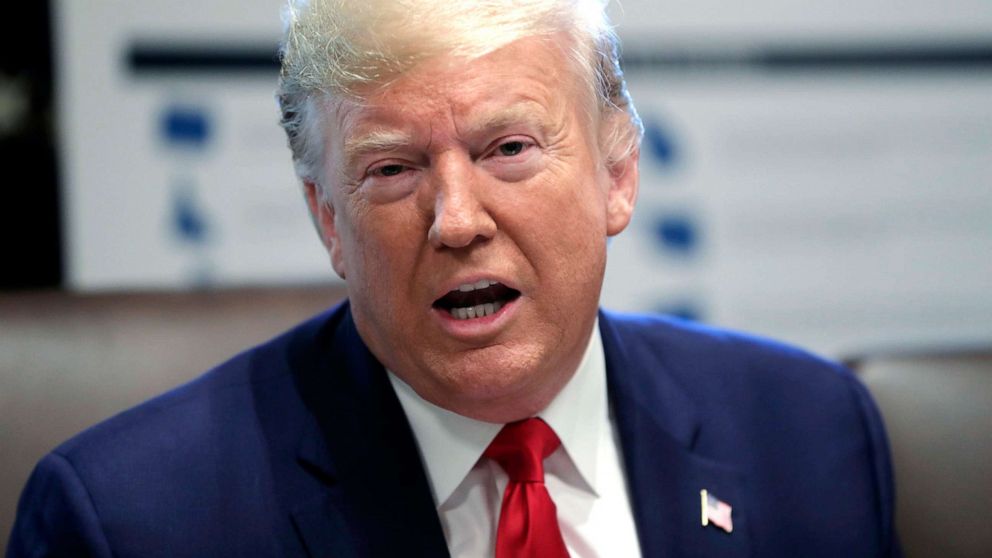Trump compares impeachment process to 'a lynching'
President Donald Trump compared the impeachment process to "a lynching" on Twitter Tuesday morning, triggering another political firestorm.
A check of his previous tweets and public statements showed that this appeared to be the first time he has used the term as president.
"So some day, if a Democrat becomes President and the Republicans win the House, even by a tiny margin, they can impeach the President, without due process or fairness or any legal rights," he wrote. "All Republicans must remember what they are witnessing here - a lynching. But we will WIN!"

Criticism of the president’s tweet was swift - from Democrats and some Republicans.
Senate Majority Leader Mitch McConnell told ABC News Senior Congressional Correspondent Mary Bruce that Trump’s word choice was “unfortunate.”
“Given the history in our country, I would not compare this to a lynching,” McConnell said. “It is an unfair process.”
“And a better way to characterize it would be as an unfair process,” he added.
GOP Rep. Adam Kinzinger of Illinois said the word referred to a “painful scourge in our history” and called on Trump to retract his statement.
“We can all disagree on the process, and argue merits. But never should we use terms like “lynching” here. The painful scourge in our history has no comparison to politics, and @realDonaldTrump should retract this immediately. May God help us to return to a better way,” Kinzinger tweeted.
A top Democrat, House Majority Whip Jim Clyburn, D-S.C., said on CNN, “"That is one word no president ought to apply to himself. You know, I've studied presidential history quite a bit, and I don't know if we've ever seen anything quite like this."
Congressional Black Caucus Chair Rep. Karen Bass, D-Calif., in a statement, called the president’s use of the word “unacceptable” and said it would “behoove” him to visit the National Memorial for Peace and Justice in Montgomery, Ala.
“Every time his back is up against the wall, he throws out the red meat of racial rhetoric and attacks communities of color, but the American people aren’t taking the bait,” she said.
Rep. Bobby Rush of Illinois, an African American Democratic congressman, in a reference to the historical connotations of the word, said, “Do you know how many people who look like me have been lynched, since the inception of this country, by people who look like you.”
“What the hell is wrong with you?” Rush tweeted.
The House's top Republican, Rep. Kevin McCarthy, R-Calif., a frequent Trump defender, said he would not have used such language.
“I don’t agree with that language,” he said to reporters. “Pretty simple.”
Sen. Susan Collins, Republican from Maine, said in a tweet of her own, “‘Lynching’ brings back images of a terrible time in our nation’s history, and the president never should have made that comparison.”
But GOP Sen. Lindsey Graham of South Carolina, chairman of the Senate Judiciary Committee, told reporters that he agrees with the president calling the impeachment probe a “lynching.”
“This is a lynching in every sense,” Graham said, defending the president. “This is un-American.”
Graham said the president’s use of the word in a tweet this morning is “pretty well accurate” in describing what Democrats in Congress are doing to the president by launching an impeachment probe.
“This is a sham, this a joke,” Graham said of the probe.
“I think lynching can be seen as somebody taking the law into their own hands and out to get somebody for no good reason,” Graham said.
“What does lynching mean? When a mob grabs you, they don’t give you a chance to defend yourself. They don’t tell you what happened to you. They just destroy you,” Graham went on.
“That is exactly what is going on in the U.S. House of Representatives right now,” Graham said.
Sen. Tim Scott of South Carolina, the only African American Republican in the Senate, also defended the president -- if not his use of the word “lynching.”
“There’s no question that the impeachment process is the closest thing of a political death row trial, so I get his absolute rejection of the process,” Scott said.
“I wouldn’t use the word lynching,” Scott added.
Asked whether he disagreed with those who see the word as racially charged, Scott responded, “Yeah, I do actually disagree. I think the fact of the matter is that you're talking about something that's akin to a death row trial from a political perspective, so we should keep our focus on the fact that this is something that is something that has been done behind closed doors,” Scott said.
Later in the day, White House spokesperson Hogan Gidley told reporters that Trump was not trying to invoke the historical context of the word, but instead was “clearly articulating” his frustrations surrounding the impeachment process.
“The president is not comparing what happened with him to one of the darkest moments in history,” Gidley said. “He’s just not.”
Trump's tweet came amid a series of tweets apparently quoting programming on "Fox & Friends," which included accounts about polling on impeachment and about former Secretary of State Hillary Clinton.
While he has previously referred to both the impeachment inquiry and Mueller probe as a “coup,” Tuesday’s comments appear to be the first time Trump has publicly used the word “lynching” to describe the investigations into his potential misconduct in office.
Trump’s allies, however, have used variations of the the word in such a context.
In September, Texas Republican Sen. Ted Cruz referred to Democratic outcry about Trump’s conversation with Ukraine President Volodymyr Zelenskiy -- which sparked the impeachment inquiry -- as a “lynch mob.”
On the campaign trail, former Housing and Urban Development Secretary and 2020 presidential candidate Julian Castro said the president’s use of the word was “beyond shameful.”
“It’s beyond shameful to use the word ‘lynching’ to describe being held accountable for your actions,” Castro tweeted.
Sen. Kamala Harris, another 2020 presidential candidate, called Trump’s tweet “disgraceful.”
“Lynching is a reprehensible stain on this nation's history, as is this President. We'll never erase the pain and trauma of lynching, and to invoke that torture to whitewash your own corruption is disgraceful,” Harris said in a tweet of her own.
George Conway, lawyer and husband to White House senior adviser Kellyanne Conway and a frequent Trump critic, called him “deranged.”
The president's reference to "lynching" comes months after the Senate passed a bill that would make lynching a federal hate crime. The bill was introduced by Democratic Sens. Kamala Harris and Cory Booker -- both now presidential hopefuls -- and Republican Sen. Tim Scott of South Carolina.
The Justice for Victims of Lynching Act referred to lynching as having "succeeded slavery as the ultimate expression of racism in the United States following Reconstruction."
"Lynching is not a relic of a painful past -- it is a present and pernicious evil that we still have yet to confront," Booker said in a statement in February.




